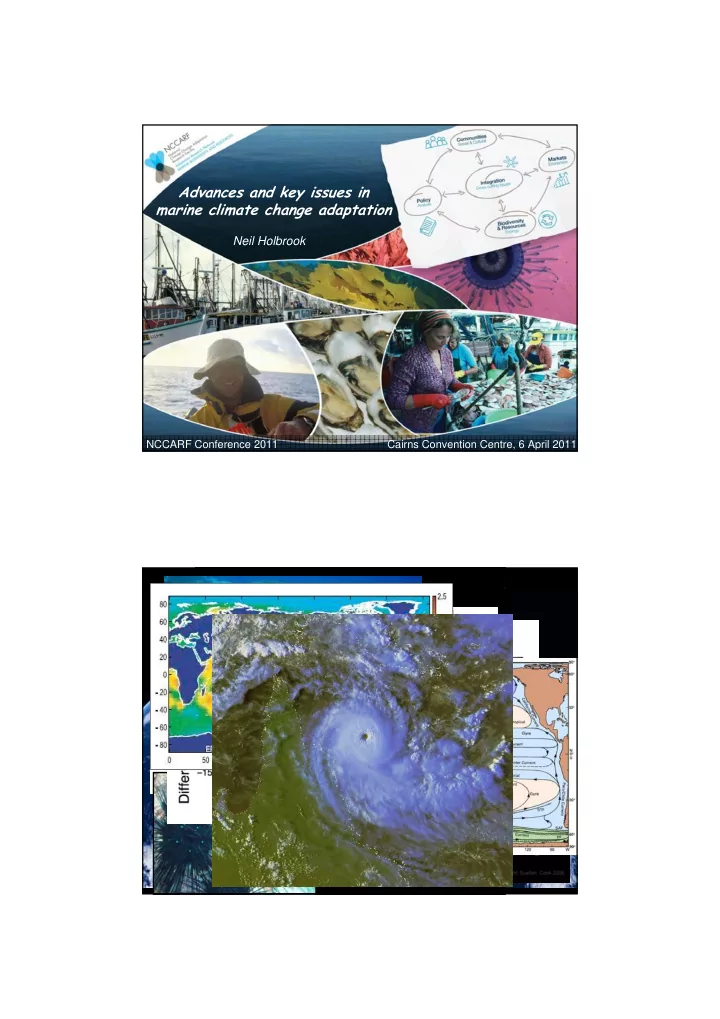

Advances and key issues in marine climate change adaptation Neil Holbrook NCCARF Conference 2011 Cairns Convention Centre, 6 April 2011 Image: Nick Graham SPM-AR4 Image: Nick Graham
Coral reefs [Anthony and Marshall 2009] bb
FRDC DAFF Action Plan Regional Programs NCCARF NARP NARP Priority Questions 2. Commercial and recreational fishing Which fishery stocks, in which locations, are most 2.1 likely to change as a result of climate change? What will those changes be (e.g. in distribution, productivity) and when are they likely to appear under alternative climate change scenarios? 2.2 What options or opportunities are there for commercial fishers in identified impacted fisheries to adapt to climate change effects through changing target species, capture methods and management regime, industry diversification, relocation or divestment?
NARP Priority Questions 3. Conservation management 3.1 Which ecosystems and species of conservation priority most require adaptation management and supporting research, based on their status, value, vulnerability to climate change and the feasibility of adaptive responses? 3.2 How should conservation managers and planners adapt their practices to ameliorate climate change risks and enhance adaptation options? What intervention strategies will increase system resilience and improve the time within which biological systems can adjust to a future climate? FRDC/DCCEE projects Marine Conservation Adaptive management of temperate reefs to minimise effects of climate change Adapting to the effects of climate change on Australia’s deep marine reserves Changing currents in marine biodiversity governance and management responding to climate change Human adaptation options to increase resilience of conservation-dependent seabirds and marine mammals impacted by climate change Pre-adapting a Tasmanian coastal ecosystem to ongoing climate change through reintroduction of a locally extinct species
FRDC/DCCEE projects Fisheries and Aquaculture Vulnerability of an iconic Australian finfish (Barramundi) and related industries to altered climate across tropical Australia Ensuring that the Australian oyster industry adapts to a changing climate: a natural resource and industry spatial information portal for knowledge action and informed adaptation frameworks Management implications of climate change effects on fisheries in Western Australia Management implications of climate change impacts on fisheries resources of tropical Australia Preparing fisheries for climate change: developing best practice for management and adaptation using three key fisheries in South Eastern Australia [ not yet contracted ] FRDC/DCCEE projects Recreation and Tourism Identification of climate-driven species shifts and adaptation options for recreational fishers: learning general lessons from a data rich case Beach and surf tourism and recreation in Australia: vulnerability and adaptation Community knowledge & strategies A climate change adaptation blueprint for coastal regional communities
Marine Adaptation Report Card 2009 http://www.oceanclimatechange.org.au/content/index.php www.oceanclimatechange.org.au
Species and biology focused How do we What drives the Reliant on fishery independent adjust? system? and dependent data. Economic and Fisheries Physical data Social Research Research Biophysical system Human system Governance & Management www.nccarf.edu.au/marine/
Integrated activity: Marine NARP Theme case study syntheses Tourism and recreational uses Commercial & recreational fishing The building blocks of economic Building resilience: Tourism, climate resilience to climate change: the case change and the Great Barrier Reef, of the Tasmanian rock lobster fishery Australia [Markets led] [Communities led] Conservation management Aquaculture Ecological, socio-economic and Climate change adaptation in the management implications of range- Australian edible oyster industry: a shifting species in marine systems social-ecological systems approach [Biodiversity & Resources led] [Policy led] Oyster Report released in August 2010
Marine stakeholder priorities Marine stakeholder top priorities Industry Government NGO Communication and education Flexible or adaptive management WA Aquaculture TAS Conservation QLD Tourism NT Commercial fishing SA Recreational fishing VIC NSW
Summary Key issues Climate change is expected to affect marine species – range (extension) – recruitment – breeding – phenology • Communication / Education / Collaboration • Climate change uncertainties challenge management approaches to be – flexible – adaptive Advances – Network thinking – Increased connect with stakeholder needs – Marine Report Card Thank you! Neil Holbrook neil.holbrook@utas.edu.au 03-6226-2027 Please visit www.nccarf.edu.au/marine/ or email arnmbr@arnmbr.org
Recommend
More recommend